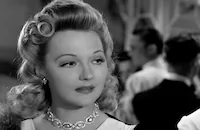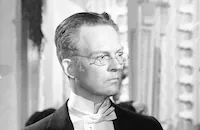Lady with a Past

Brief Synopsis
Cast & Crew
Edward H. Griffith
Constance Bennett
Ben Lyon
David Manners
Don Alvarado
Albert Conti
Film Details
Technical Specs

Synopsis
After a fashionable New York party, drunken socialite Donnie Wainwright convinces Venice Muir, a shy, intelligent heiress, to elope with him to Paris, then leaves with another woman before his Europe-bound ship departs. Determined to become the charming flirt she believes Donnie desires, Venice sails to Paris alone and hires Guy Bryson, a broke, unemployed American, to be her "gigolo." By inventing gossip about Venice's romantic past and strategically introducing her to a number of eligible bachelors, Guy quickly transforms Venice into the most desirable woman in Paris. When Donnie arrives in the city for a short business trip, he is shocked by Venice's entourage of admirers, which includes Rene, the Viscomte de La Thenardier. On Guy's advice, Venice teases the dumbfounded, jealous Donnie with calculated indifference and flirts openly with her other suitors. Then, on the night that Donnie is to leave Paris, Rene, who is heavily in debt to a married woman, proposes to Venice during a lavish party. Venice gracefully rejects Rene and accompanies Donnie to the train station. Just before his train pulls away, Donnie also proposes to Venice, but she is distracted by the arrival of Guy, who informs her that Rene has committed suicide. Although Venice knows that Rene's death was related to his bankruptcy, the newspapers report that the viscomte killed himself because of her rejection, and Venice's reputation as a femme fatale blossoms. Depressed, Venice sails back to New York with Guy and is greeted by newspaper headlines announcing that Guy's wife is suing her for alienation of affection. After saying goodbye to her "gigolo," Venice attends another party, where she is sought after by every man except Donnie, who now rejects her because of her supposed indiscretions. Furious at Donnie's hypocrisy and lack of faith, Venice spurns him, but eventually accepts his apologies and his proposal.

Director
Edward H. Griffith
Cast

Constance Bennett
Ben Lyon

David Manners
Don Alvarado
Albert Conti

Merna Kennedy

Astrid Allwyn

Donald Dilloway
Blanche Frederici
John Roche
Cornelius Keefe

Nella Walker
Freeman Wood

George Irving
Arnold Lucy
Helene Millard
Crew
E. J. Babille
Harry Joe Brown
William Charney
Carroll Clark
Stanley Cortez
Charles Craft
D. A. Cutler
Horace Jackson
Lucinda Inc.
Hal Mohr
Charles R. Rogers
Emmett Schoenbaum
William Skall
Max Steiner
Robert Surtees
Gwen Wakeling

Videos
Movie Clip


Film Details
Technical Specs

Articles
Lady with a Past
Forget for a moment that Bennett, one of the most spirited stars of the 1930s, might not seem to be the best choice to play an awkward bookworm. With that gently upturned nose and chic tousle of satiny blonde hair, she's such a glamorous, lively presence that it's hard to believe she could ever be believable as a wallflower. But perhaps by sheer force of will, she pulls it off in Lady with a Past, a picture that represented a departure of sorts for the actress.
In earlier pictures like The Easiest Way (1931) and Sin Takes a Holiday (1930), Bennett had often played desperate or somehow compromised characters. Lady with a Past was different: For one thing, it was a comedy and not a melodrama. And for another, Bennett's character, despite her social awkwardness, is clearly a woman who simply doesn't realize how much control she has over her own life - or over the men around her. Even her name, Venice Muir, has a subtle, exotic pull. Watching Venice discover her powers of attraction is one of the great pleasures of the movie, and of the performance: At the beginning of the picture, she's a woman with a penchant for spending lots of time alone in her room. ("I talk so much to myself that I'm all worn out when I meet people," she laments.) By the end of the picture, she's in a position to forgive the fellow who previously rejected her, but she doesn't give in to him easily, and her gently glowing self-confidence, newly won, is surprisingly convincing.
But if Bennett was playing a meek kitten who learns to roar, the story in real life was something different. Bennett was an extremely sought-after star; in the early 1930s, Hollywood columnists claimed she was one of the highest-paid actresses in the movies. (Her salary for Lady with a Past was $112,000, a hefty percentage of the movie's $541,000 production cost.) According to biographer Brian Kellow, Bennett took advantage of her star power, dictating camera angles and lighting specifics and even, at times, calling for certain crew members to be replaced if she didn't like them. She was unforthcoming with the press, and when she did talk, she made it clear that she had little but contempt for the movie industry. Her reputation was well known: When Katharine Hepburn was just starting out at RKO, costume designer Walter Plunkett warned her against being too demanding, using Bennett as a negative example: "From the way you are starting," he said, "you'll soon be [worse] than Constance Bennett."
Bennett, it seems, was simply so confident in her abilities and her stature that she could get away with bad behavior. She had come from a family of actors: Her father, theater actor Richard Bennett (possibly best known to movie fans as Major Amberson in The Magnificent Ambersons, 1942), and her mother, silent film actress Adrienne Morrison, raised three future actresses, Barbara, Constance and Joan. Constance launched a successful career in silent films, only to "retire" after her marriage, in 1925, to railroad heir and playboy Philip Morgan Plant. After divorcing Plant in 1929, she resuscitated her career and found even greater success in talkies.
In Lady with a Past, you can see why. At the time of the movie's release, New York Times critic Mordaunt Hall was suitably charmed: "This Lady with a Past is a bright and entertaining production, somewhat unconvincing at times, but nevertheless enjoyable," he writes. "It is a handsomely staged affair, with many amusing incidents and particularly clever dialogue." And as Kellow notes, this new type of role brought out something fresh in Bennett. "She has a special glow," he writes. "In her past films, she had exhibited a kind of toughness that made her seem a somewhat synthetic personality - but in Lady with a Past, she is relaxed and luminous, as if the opportunity to play the bungling Venice, forever unsure of herself, had released a certain warmth that she had never before fully revealed." It's possible, also, that Bennett never looked lovelier, swathed in an assortment of drapey velvet gowns and fur-trimmed evening coats. Her glamour quotient in Lady with a Past is off the charts; she gives hope to shy bookworms everywhere.
Producers: Harry Joe Brown, Charles R. Rogers
Director: Edward H. Griffith
Screenplay: Horace Jackson (screenplay), Harriet Henry (novel)
Cinematography: Hal Mohr
Music: Max Steiner
Film Editing: Charles Craft
Cast: Constance Bennett (Venice Muir), Ben Lyon (Guy Bryson), David Manners (Donnie Wainwright), Don Alvarado (Santiagos), Albert Conti (Rene), Merna Kennedy (Ann Duryea)
BW-80m.
by Stephanie Zacharek
SOURCES:
IMDb
The New York Times
Brian Kellow, The Bennetts: An Acting Family, The University Press of Kentucky, 2004

Lady with a Past
Quotes
Trivia
Notes
According to an RKO studio memorandum, the total cost of the production was $541,075. Constance Bennett's salary was $112,000, director Edward H. Griffith's was $60,000. RKO borrowed Ben Lyon from Warner Bros. and David Manners from First National for this film. Modern sources add the following cast members: Bruce Cabot (Dance extra), Don Terry (Friend) and Bill Elliott (Brown).














